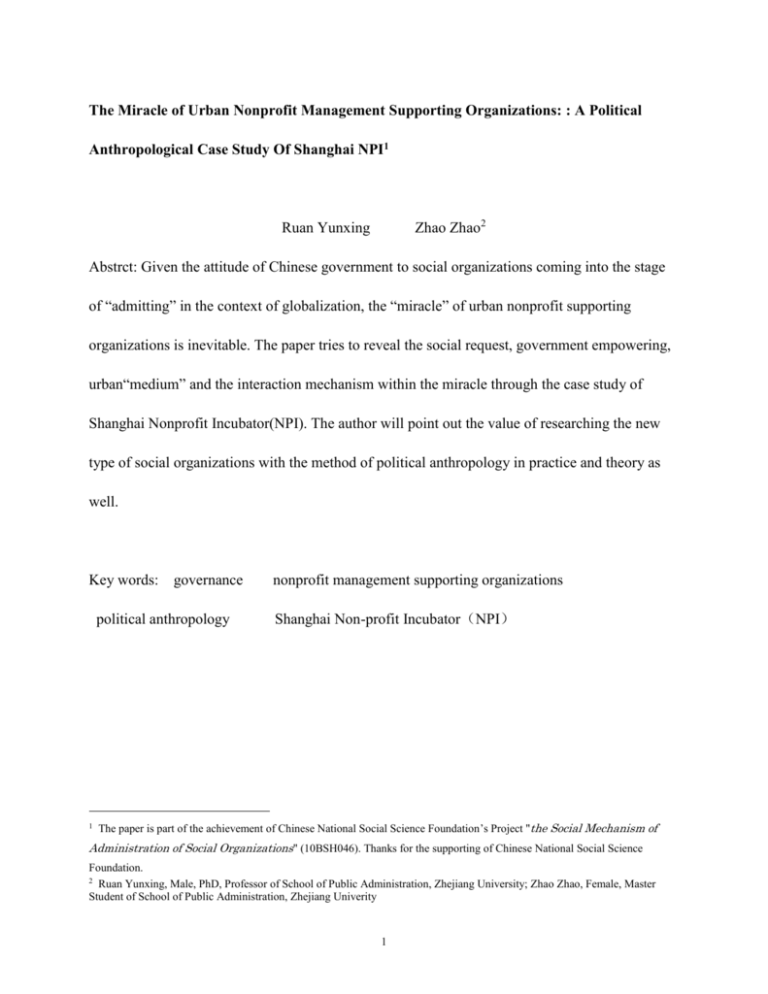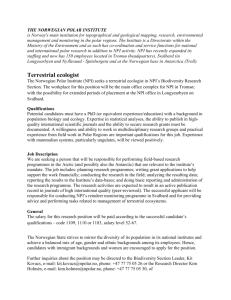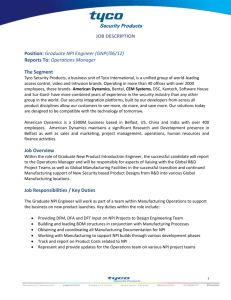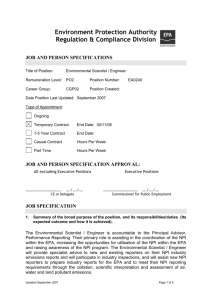A Political Anthropological Case Study Of Shanghai NPI
advertisement

The Miracle of Urban Nonprofit Management Supporting Organizations: : A Political Anthropological Case Study Of Shanghai NPI1 Zhao Zhao2 Ruan Yunxing Abstrct: Given the attitude of Chinese government to social organizations coming into the stage of “admitting” in the context of globalization, the “miracle” of urban nonprofit supporting organizations is inevitable. The paper tries to reveal the social request, government empowering, urban“medium” and the interaction mechanism within the miracle through the case study of Shanghai Nonprofit Incubator(NPI). The author will point out the value of researching the new type of social organizations with the method of political anthropology in practice and theory as well. Key words: governance political anthropology 1 nonprofit management supporting organizations Shanghai Non-profit Incubator(NPI) The paper is part of the achievement of Chinese National Social Science Foundation’s Project "the Social Mechanism of Administration of Social Organizations" (10BSH046). Thanks for the supporting of Chinese National Social Science Foundation. 2 Ruan Yunxing, Male, PhD, Professor of School of Public Administration, Zhejiang University; Zhao Zhao, Female, Master Student of School of Public Administration, Zhejiang Univerity 1 1 The origin of research and the background 1.1 research origin It is not a long time for nonprofit management supporting organizations (MSO) establishing in China with legitimate identity, so it is not strange that the participated observation research towards MSO is limited. However, given the time that nonprofit organizations especially nonprofit management supporting organizations play a very important role in China’s social transformation and social construction, the participated observation and theoretical construction is an urgent topic. A college student I known wanted to establish a grass root nonprofit organizations in 2009. I encouraged him to realize her ideal, at the same time; I got a chance to observe an NPO ever since its establishment. Sep. 2009, the newly founded Hearing Art in Community applied into the incubator hold by NPI, the nonprofit organization incubator came into our research. The authors visited NPI, Hearing Art in Community for 5 times in one year.1 Given this background, the paper based with the material from fieldwork, focusing on NPI, try to provide a social fact and have some discussion about nonprofit management supporting organizations and city governance in temporary China. 1.2 academic background 1 The time for visit were 200910, 2010030-31, 20100701, 20101204, 20110113-14, the second author come along for the first three time. 2 The author believes that nonprofit management supporting organizations means organizations that can integration resources, and provide support for other organizations with the services as intermediary, consulting, training as well as trusteeship. From our first stage research, the author thinks that comprehensive supporting organizations are identified as its social function and cover from foundation to corporation aggregate.1 Considering contemporary method of dividing social organizations in China (foundation, private non-enterprise unites, social groups), MSO mainly stand in private non-enterprise unites. At the same time, the function in foundation supporting nonprofit organizations could be seen as the capital supporting organizations, and there are also some single supporting organizations in social groups.2 At present, researches focused on supporting organizations in China are very limited. Xu Yushan’s paper is an original work about the topic. However, her paper mainly describe the supporting organizations’ function and the net as well as communication hold by supporting organizations.3 It is noteworthy that the Public Policy Institute of Renmin University of China hosted a “supporting organization development forum” recently. And that the idea of “supporting organizations become the most public welfare and the autonomy of a new type of social organization” became an consensus in the forum.4 1 Refer to Shui Bing Ming Qu Yu An Dao: Zhuan Xing She Hui Shi Qi De Zhong Guo Fei Ying Li Fa Ren Zhi Du. Gao Bingzhong, Yuan Ruijun Blue Book of the development of Civil Society in China, Peking University Press, 2008:62-64 2 We should know that the dividing method in China is a response to the social fact, we must face the problems in it (refer to Shui Bing’s paper). At the same time, Japan is reforming its system in public corporation. Refer to 新公益法人のすべて.清文社.2006. 3 Xu Yushan the construction innovation of social organizations: the development of supporting organizations. Management of Social Organizations. 2010:8 4 supporting organizations become the most public welfare and the autonomy of a new type of social organization, http://www.chinavalue.net/Blog/420696.aspx 3 1.3 the overview of the object of field work Non-profit Organization Incubator (NPI) of Pudong Shanghai has established in Pudong at Jan. 2006. It is registered in Pudong Civil Affairs Bureau with Lv Zhao as its legal representative. Pudong district locates in the east of Shanghai with 11 town, 12 district offices, 618 residents committee, 226 village committee.1 In the central and southern part of Pudong district, No. 613 Eshan Rd. there is a “Xing Ling Venture Park”. The park was a factory belonged to Shanghai Textile Holding Grouping before with four buildings.2 Now, with the participation of Pudong government, the park was designed and reformed in 2008. The A building is Public Service Park, and the headquarter of NPI is right in the second floor of A building. At the present, NPI was delegated the nest of social innovation. Wulixiang Community Service Center is delegated four communities located in Yangpu district and Pudong district (see picture 1). Our research began at the headquarter of NPI. Ever since entered the office of NPI, two panels first caught my eyes. The one left showed the organizations in the incubator, and the one right showed the organizations already out of the incubator. The other thing should be noted is the purpose of NPI helpful of social innovation, foster social entrepreneurship. Seeing from the purpose, the aim of NPI is not only do something good to help others but have deeper think and bigger ideal. The office of NPI is divided into two parts, one for the staff of NPI, the other part for the staff of organizations in the incubator. 1 2 Statistic Yearbook of Shanghai 2009, http://www.stats-sh.gov.cn/2003shtj/tjnj/nj09.htm?d1=2009tjnj/C0101.htm Shanghai government information office, http://www.shio.gov.cn/shxwb/jzfw/node179/node350/userobject1ai5454.html 4 2 the establishment of NPI and social innovation NPI NPI was registered in Jan. 2006. After five years of development, NPI is now outstanding in nonprofit organizations in China. However, the developing was not easy, the achievement related to the quality of the team and the social trends. The founder of NPI called Lv Zhao. At the end of 2005, Lv Zhao, who was the deputy director of NPO Information Center of Beijing expressed the willing of founding a NPO supporting organization to the Pudong Civil Bureau and won the permission. At that time, Pudong district was just had the permission of being national comprehensive reform pilot area. NPI meet lots of problem at first. Lv Zhao planed to copy the mode of Beijing in Shanghai, but the situation of Shanghai is different from Beijing. Beijing has a large number of NPO but Shanghai has few of them.1 NPI did not find the right mode in Shanghai at that time (FT003). Though the government have already realized the function of social organizations, as a social organization, how to find the suitable way for itself is also a problem. It is the character of temporary China social organizations that although there is a booming trend of NPO, but the development model and exploration of the road has just begun. After the exploration of one and a half year, NPI began its first business of nonprofit organizations incubator, it is also the first nonprofit organizations incubator in China. Then NPI explored the business of community trusteeship, united way, corporation social responsbility consulting. The business developed quickly, and the scale of NPI enlarged fast. At present, NPI based in Shanghai and has agencies in Beijing, Chengdu and Shenzhen. Now it has seven 1 The case of nonprofit organizations in China (2009), NPO information consulting center, NPI 5 members in the council, six managers and four global consultant as well as 18 partners. The paper will focus on the basement of NPI in Shanghai. The work of NPI earned lots of prize as well, such as the 5A social organization of Shanghai and the excellent social organization of China.1 The paper focuses on the headquarters of NPI. We will analyze how NPI doing its business to response to social request. Ever since its establishment, NPI identified itself as a supporting organization. NPI is adjusting its strategy all the time. At first, it was a middle organization, now it is called the social innovation engine. The business of NPI roughly covered the request of newly founded and grass root organizations. The business is now divided into four parts: NPI Enpai, Wulixiang Community Service Center, United Way and Nonprofit Organization Management Consulting. When we look at the business, we can view it as a response to the social request. 2.1 NPI Enpai NPI Enpai is a center for newly found NPOs, it combines of the incubator, fundraising and NPO capacity building. 2.1.1 Non-profit organization incubator Ever since its establishment, NPI is adjusting to find the best way to support other grass-root NPOs. At first, NPI want to sustain the old mode of NPO Information Center of Beijing, but the staff of NPI gradually found that the situation of Shanghai is apparent different from that of 1 See the events of NPI 6 Beijing. The international nonprofit organizations and foundations has been working in Beijing for almost 20 years, the frequent international communications and capital supporting lead the emerging of NPOs in Beijing about 10 years ago. The ten years' development make the NPOs in Beijing much more booming than that of Shanghai, and the NPOs in Beijing cover the subject of environment, education, poverty, so it is useful to provide capacity building in Beijing. Compared to Beijing, the number of NPOs in Shanghai is much smaller as well as its scare.1 Base on the condition, it is not enough to provide capacity building but to incubate some nonprofit organizations in Shanghai and help them to develop. So NPI changes the way of work and this change lead to the first nonprofit incubator in China.2 The incubator was designed at 2006 and began to operate since Apr. 2007. The incubator relies on the community and call for the supporting of government. There is a professional team to operate the incubator. And there are supervises form the public. Any NPO which wants to come into the incubator must pass a series of rigorous examinations, it will cost three to six months. A NPO will stay in the incubator for a period of one year, during which the incubator provides services including office space, office equipment, capacity building, small subsidies and registration help for the NPOs. When the NPO incubated come out of the incubator, NPI will still provide services for one year to help them recover the problems. The incubator operated for three times. The first time is from 2007 to 2008, the second time is from 2008 to Sep. 2009, the third time is under incubating. 1 The case study of management of nonprofit organizations in China (2009), NPO Information Consulting Center, the Nonprofit Organization Incubator 2 Seeing appendix 1 7 The incubator operates well at present. According to the introduction of NPI staff: Why did we design these five sections? It is because the NPOs need such kind of aid. In the time operating the incubator, we found it to be really helpful to the NPOs. Now, this mode of incubation has been copied to Beijing and Chengdu at 2008. At Sep. 2009 the incubator office of Shenzhen began to do the business as well. 2.1.2 Venture philanthropy Venture philanthropy provides fund for newly found and small scale social organizations, especially the social entrepreneurs. It also supplies management and technical supports. At the moment, NPI cooperate with Lenove and ApaxPartners to run the venture philanthropy program. At 2009, NPI designed and hold the first community venture philanthropy in Shanghai, which is proposed by Shanghai Civil Bureau. The program cooperate with Lenovo is suggested by NPI and also be devised by NPI. The corporate of Lenovo provide the material and fund for the program. The program began at Dec. 2007 and won the attention of NPOs in China. The number of organization applying for the program reaches 90 each time. The cooperation with ApaxPartners is patronaged by ApaxPartners, and NPI is response to collect one to two organizations as the recipients.1 2.1.3 Capacity building In the field of capacity building, NPI focuses on three aspects: enhancing the capacity of organizations and people, capturing sensitive social issues and establishing research projects for NPOs, and promoting self-discipline. It is really interesting for NPI to think of promoting 1 The promotional materials of nonprofit organization incubator 8 self-discipline as its mission which reflects that the development of NPOs in China is not regular and need to set the norms for it. 2.2 Wulixiang Community Service Center In May 2008, NPI became the trusteeship of the largest civic centre in Shanghai. Related to this, NPI originate Wulixiang Community Service Center which is also a nonprofit organization and once being incubated in the incubator. At Dec. 2008, Wulixiang Community Center was registered in Pudong Civil Bureau. The Community Service Center does not provide community services itself but used other NPOs to do the actual services. NPI, in fact, became a manager in the community service center. The Community Service Center take over the hardware, select NPOs into the community to do the service and supervise the NPOs. From the establishment to Mar. 2010, Wulixiang Community Service Center has been the commissioning manager of three communities.1 During the work of being commissioning manager of Sanlin Shibo Jiayuan Civic Center, NPI has imported social enterprise and other professional NPOs, and also bring forth some program which have good prospect. Accord to the director of NPI, the business of being commissioning manager is the largest business of NPI which means most of the workers are devoted to it and the main income comes from it.2 1 2 The data comes from the website of Wulixiang Community Service Center http://www.wulixiang.org.cn/aboutus_01.php The data comes from the interview 20100701 9 In this way, NPI can help the NPOs to find a way to operate their services and help the community enjoy the professional service of NPOs. 2.3 United Way The Public Welfare Development Fund of Shanghai was established at the end of 2009, registered in Shanghai Civil Bureau. The fund focuses on holding large-scale public welfare activities in order to provide supports to NPOs. As we all know, capital is very important to grass-root NPOs. The fund is not only for NPI itself but for all the NPOs in China. In the interview we had with YJN, he said that at present, the funds in China operate in different ways. The funds belong to the government usually the money itself, and the funds belong to corporate do not function regularly. So NPI want the Public Welfare Development Fund of Shanghai being a example of all the funds in China. 2.4 Corporate social responsibility and NPO management advisor Corporate Citizenship in Action is an consulting company to help the corporate perform corporate social responsibility effectively. It was found at May. 2006. CCIA facilitates the cooperation among corporate, government and nonprofit organizations in order to realize the outcome multi-win of corporate and community.1 CCIA has some relationship with NPI. The founder of NPI is also Lv Zhao, and it was once incubated in the incubator.2 1 2 The data comes from the website of CCiA: http://www.csrconsulting.com.cn/about.htm Seeing in the website of NPI: http://www.npi.org.cn/hatch.php?pid=0&page=2 10 3. The social mechanism of the quickly development of NPI 3.1 social request: the transform of social construction and community governance need multiple governance object The establishment of NPI is related to the social construction reform and the change of model of governance. What is more, the successful of NPI in Pudong is also because of the unique character of Pudong. Firstly, from the social demands, with the development of market economy and the diversification of social interests, the social construction of contemporary China is significant different from the time when P.R.C. was founded. The social organizations are one kind of governance object now.1 Secondly, it is related to the unique character of Pudong district. During the interview we had with the Department Head of Pudong Civil Affairs W, he expressed that at the time when Pudong district was being set up, the economic condition was not good. Additionally, during that time, the old economic pattern in China clashed and the traditional way of social welfare faded away. So the government of Pudong district needed to find a way to solve the problems associated with this period of transformation. It is in such an environment that NPI was welcomed in the Pudong district. (FT002) 1 Huang Xiaoyong, Cai Liqiang, Status of Chinese Civil Society Organizations, Their Roles and Suggestions. The Report of Chinese Civil Society Organizations. Social Science Academic Press, 2008 11 3.2 government empower: a new type of social organization managers The author thinks that from the perspective of the relationship between a nation and society, we can roughly divide the relationship into three stages. First, restrain stage from 1980s to the end of 1990s; second, admitting / empower stage since the start of 21st century1; third, partner stage. We can see that NPI is participating governance during doing their business, we have to say this is related to the background of government empower. We will analyze the nonprofit organizations incubator to reveal how NPI participate social organizations’ management. The author believes that the most important influence of the incubator is to foster social organizations to enlarge the scale of them as for presently China, to enlarge the scale is more important than to reform what are already exist (FT003). To establish a nonprofit organization in China is not easy, the founder may meet the tension both from the policy and society. To register a nonprofit organization is the first difficulty one may meet. As the society, the majority of people are not fond of public welfare; most people would not understand why some people choose nonprofit organizations as their career life. In the interview with Lv Zhao, he told us that, the capability one need to establish a nonprofit organization in China is not just fond of public welfare but to have the ability to call people to follow you, one must explain to others for why do such a thing(FT 003). In the observation, the author also noticed the instable of an organization, the instable not just existing in the business 1 See Yuan Ruijun, the Impact of Government transformation to the System of Social Organizations’ Management. Blue Book of the Development of Civil Society, Peking University Press, 2008:31-44; Kang Xiaoguang, the Relationship between State and Society in a Reform Era: Administrative Absorb Society, 30 Years of Civil Society in China, Social Sciences Academic Press, 2008: 287-377 12 but also in the team and mental state. For the incubator, it is nearly impossible that an organization in the incubator could grow ripe enough; the wish of the incubator is that the organizations could find a suitable way to do their business (FT001). What NPI has done could be though of foster nonprofit organizations in the perspective of society rather than state. The effect of society together with the action of government as well as corporation social responsibility does well in fostering social organizations. Of course, NPI also takes part in the services of social organizations. Free office space, office supplies and monthly subsidies is very important and very useful resource for start-up of small, grass-roots organization NPO. And NPI can supply resources for small organizations to grow since they can be helpful in find founds and in the time of registering. In the field of management, if a NPO wants to come into the incubator, it must sign a contract to regulate the management. In the future operation, the NPO must submit its operation report to NPI. Additionally, NPI bears another responsibility: to promote self-discipline in public welfare. The public welfare of China is at initial stage and lacks of regulation, so what NPI want to do means a lot to the development of nonprofit organizations of China. From this, we can find that apart from the support NPI is giving to NPOs, NPI in fact bears the responsibility of management. The management does not come from government but another NPO (NPI is also a NPO) which has deep understandings of NPOs. To some extent, this kind of management comes from the public, the third party, in fact, is the management of NPO itself. Compared with the government, NPI has a better knowledge of NPOs, so the management can be more effective. 13 3.3 new medium in city: social entrepruneur1 During the time the author doing the research of contemporary rural organizations, the author find that an important factor of the growth of this kind of organization is a leader with modern knowledge and literacy. The author called this kind of people as medium. The medium can influence others gradually. For the organizations in the city, the author finds that the difference in structure is mainly because of the difference in medium. Different medium have different influence to decide the structure of an organization. The success of NPI is also related to its medium which we could call them social entrepreneur or new citizen. The staff of NPI usually has high levels of education; there are 2 PhD in 35 workers as well as 12 masters degree employees, some of the workers have also studied abroad. New employees are undergraduate students with work experience from famous universities or having master degrees.2 NPI is a non-profit organization with business background. According to the interview of deputy director WZY, NPI's management team has a solid business background; they have worked in business for at least 8 years, which has resulted in NPI having business characteristics such as 1 As the principle of social entrepreneur, see Chu Songyan, the Growth of Social Entrepreneur and the Rise of Social Organizations, Gao Bingzhong, Yuan Ruijun, Bulu Book of the Development of Civil Society in China, Peking University Press, 2008: 430-434; the author think highly of Joseph A.Schumpeter’s opinion that the group of social entrepreneur is important in social innovation. There is no doubt that the innovation is the character of this group. 2 The data comes from the interview 20091030 14 being pragmatic and results-oriented. This kind of working style has also made the organization more attractive to external resources. 4 discussion and conclusion The topic of social organizations has an important position both in the academic field and politics. The paper analyzed how NPI response to social request, we find that social request, government empowers and city medium made the fast development of NPI. As an nonprofit management supporting organization, NPI connects social and government, help government to perform its functions and response to social request. The practice of NPI reveals that the cooperation of government, market, social can foster social organizations and helpful to social innovation. The paper answered the question that how the fast development of nonprofit management supporting organizations come through case study of NPI. However, we need to explore how NPI cooperate with other organizations and the relationship of NPI and local government to answer the question of the mechanism of nonprofit management supporting organizations’ quickly rose in cities. Another question Anthropology must explore is how the medium formed. On one hand, the question reflect the principle of subjectivity and constructive in anthropological reflection, and individual research in the method of expanding case study. On the other hand, the question could help us understand the difference of organizations in rural and urban China. At last, the author would like to point out that comparative study is important. For example, the situation of social organizations in Japan and China has many similarities but also many 15 differences, to clarify the similarities and differences can help us understand the problem in China and make some contribution in the academic background. 16 Reference Bailey,N., Barker, A., & Macdonald, K, Partnership: Agencies in British, Urban Policy, London: UCL Press,1995 Chu Songyan etc: The Comparison of NGO Management in China and Abroad, Chinese Academic of Governance Press, 2008 Deng Guosheng: Assessment of Non-profit Organization, Social Sciences of Academic Press, 2001 Gao Bingzhong etc: the Blue Book of the Development of Civil Society in China, Peking University Press, 2008 Huang Xiaoyong: the Blue Book of Social Organizations--the Report the Social Organizations of China, Social Sciences of Academic Press,2008 Jan-Erik Lane: New Public Management,London Rout ledge,2000 John J. Corbin, A Study of Factors Influencing the Growth of Nonprofits in Social Services, Nonprofit and Voluntary Sector Quarterly, vol. 28, no. 3, September 1999 296-314 , Joseph A. Connor, Stephanie Kadel-Taras, Diane Vinokur-Kaplan The Role of Nonprofit Management Support Organizations in Sustaining Community Collaborations, NONPROFIT MANAGEMENT & LEADERSHIP, vol. 10, no. 2, Winter 1999 Julie Fisher: Nongovernments:Ngos and the Political Development of the Third World, Rawat Publication, 2003 Tim Bartley, How Foundations Shape Social Movement: The construction of an Organizational 17 Field and the Rise of Forest Certification, Social Problems, Vol. 54, Issue 3, pp.229-255 Wang Ming: 30 Years of Social Organizations in China--Towards Social Society (1978--2008), Social Sciences of Academic Press, 2008 Wang Shizhong, Governance Theory and Its Applicability of China, Zhejiang University Press, 2009 Yu Keping Economic Globalization and the Change of Governance, Philosophical Studies, No.10, 2010, P17-25 Firsthand materials The case study of management of nonprofit organizations in China (2009), NPO Information Consulting Center, the Nonprofit Organization Incubator The contract of NPI and incubated organizations The publicity of New Citizen Living Center The management rules and financial supervision rules of nonprofit organization incubator The newsletter of Shanghai Xintu Health Promotion Organization, Sep. 2009 The website of Wulixiang Community Service Center http://www.wulixiang.org.cn/aboutus_01.php The website of NPI http://www.npi.org.cn/ The website of CciA http://www.csrconsulting.com.cn/about.htm The website of Xintu: http://www.xintu.org/ 18 The blog of the new citizen living center: http://blog.sina.com.cn/s/blog_60e457570100f9pw.html Interview materials(FT20100701 ,FT20100331,FT20091030,FT20110114) 19




